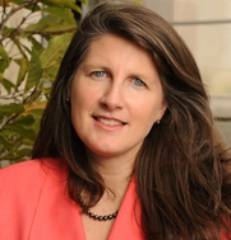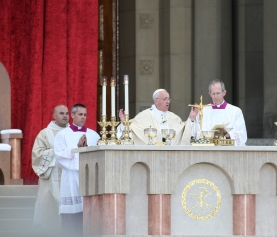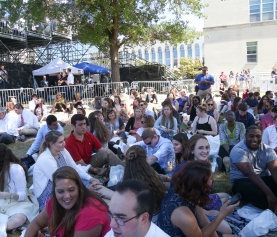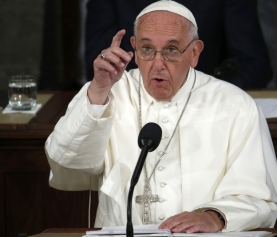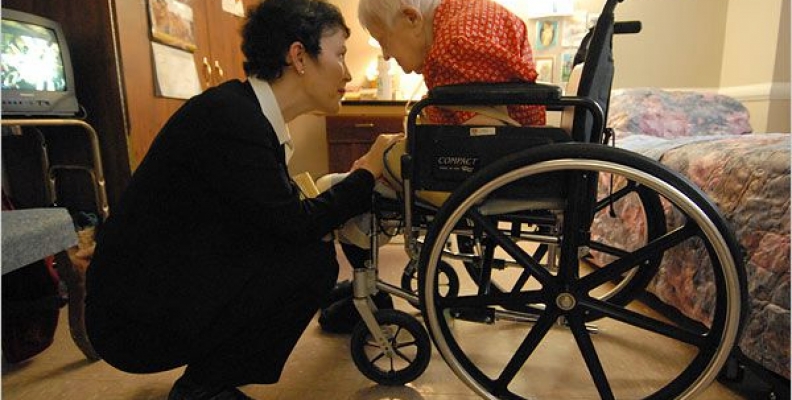
Linda Plitt Donaldson: From Encounter to Solidarity to Action
Pope Francis is making the life and teachings of Jesus Christ central to his papacy. He is drawing from his Jesuit formation to fearlessly promote the gospel teachings and a vision of a church that is poor and for the poor. Pope Francis is urging us to cultivate the mind of Christ through prayer and encounter, so that “it is no longer I who live, but Christ who lives in me” (Gal 2:20). And when we are able to cultivate the mind of Christ, our eyes and ears and hearts are open to people who are poor and suffering, and we are drawn to them.
This explains much of the resonance of Pope Francis with social workers. People who are called to social work often have eyes, ears, and hearts that are already open, to some degree, to people who are poor, marginalized, and suffering. And, if social workers allow themselves to be vulnerable in these encounters (and not to hide behind a particular expertise or position of privilege), their hearts can be further broadened, and they can be transformed by these experiences.
Pope Francis speaks about the mutuality in our relationship with people who are poor. “In a very real way, the poor are our teachers. They show us that people’s value is not measured by their possession or how much money they have in the bank.”
“In their difficulties, [the poor] know the suffering Christ. We need to let ourselves be evangelized by them. . . . We are called to find Christ in them, to lend our voices to their causes. . . .” (Evangelii Gaudium, 198). Social work students will attest that the best teachers in their programs were the people they served in their field placements.
If we open ourselves to be transformed by these encounters, we can move to a place of true solidarity, where we feel in our hearts that our brokenness is bound with the brokenness of those we encounter. And we may gain the courage to take the challenge that Pope Francis and the gospel so plainly set before us — that is, “working to eliminate the structural causes of poverty and to promote the integral development of the poor” (EG, 188). Then we can honestly examine, for ourselves and for our country, the richest country in the world:
· What are we doing to address the structural causes of poverty for the 45 million people and 20% of children who live in poverty, and the additional 14.7 million people who live in near poverty or between 100 and 125% of the federal poverty level.
· What are we doing about the growing income inequality and stagnant wages that keep families mired in poverty? Today, 1.7 million more children live in low-income working families than during the Great Recession.
· What are we doing about the racism in society where families of color disproportionately live in poverty; where black children are four times more likely than white children to live in poverty; where people of color are over-represented in our prison system; and where communities of color experience years of neglect, disinvestment, oppression, and cycles of hopelessness that can create conditions for violence (and peace), as exemplified by the social unrest in Baltimore only two months ago?
· What are we doing about the cost of housing that is causing a larger share of American families to pay more than half of their paycheck on rent and utilities, and that is making it more difficult for low-income families and people who are homeless to find a place to live?
These are just some of the structural causes of human suffering (poverty, inequality, stagnant wages, racism, housing costs) that make manifest some of the daily struggles social workers encounter here in the United States, such as homelessness, addiction, depression, child abuse and neglect, and violence. Pope Francis invites us to touch these wounds so that we may be transformed by them and strengthened to stand with our brothers and sisters who are poor, to seek structural change, and to cultivate “habits of solidarity” that ultimately “restore to the poor what belongs to them” (EG, 189).
— Linda Plitt Donaldson is an associate professor in The Catholic University of America National Catholic School of Social Service.

